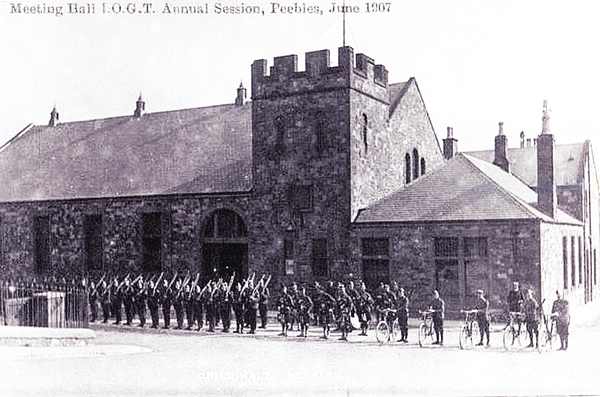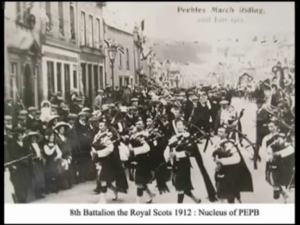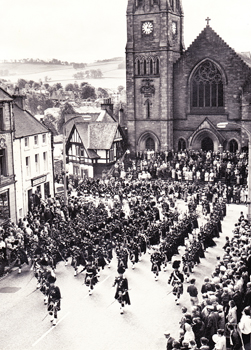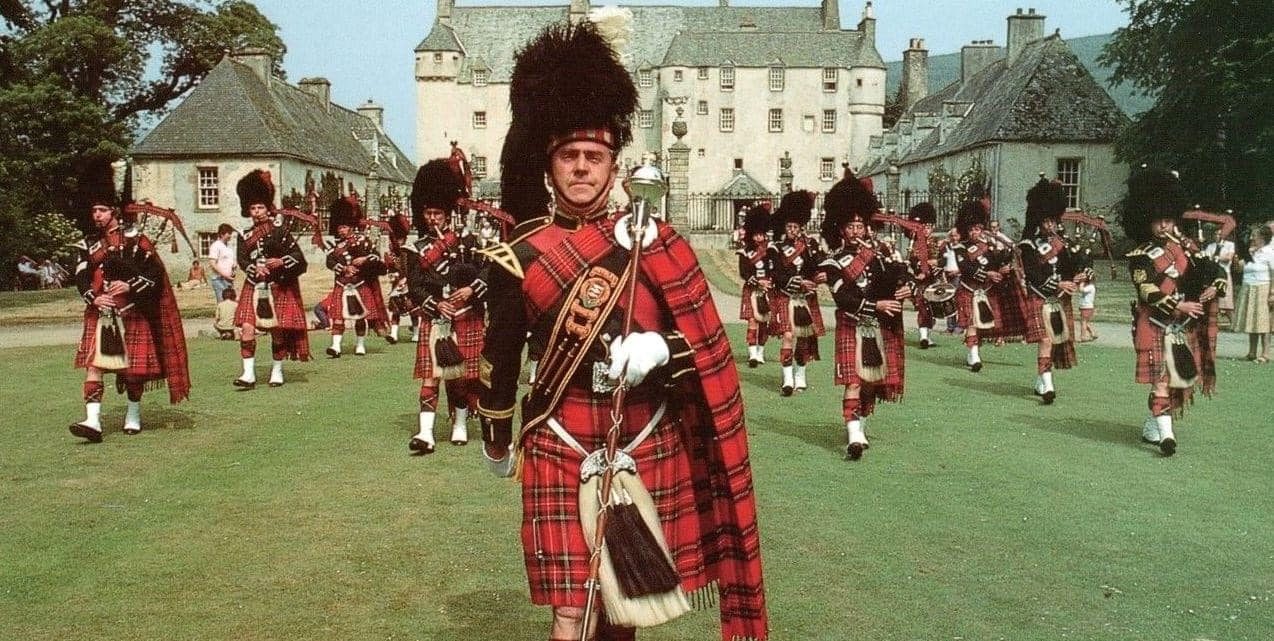Peebles Ex-Servicemen’s Pipe Band History
During the First World War or The Great War of 1914 to 1918, the Country suffered from a tremendous upheaval that had never been experienced before and it was one to which Peebles, like all other Towns and Communities, was shown no exception. Prior to the out-break of The Great War, the British Army had always been regarded as being a small but very efficient and disciplined fighting force. However, this was all to change in that, during this four year period, hundreds of thousands of civilians were suddenly to become soldiers as a result of volunteering or as was the case from 1916 onwards, all men aged between 18 and 41 were considered liable for conscription.
Peebles has long since been regarded as part of the Recruitment Area for the Royal Scots which forms the 8thBattalion Royal Scots.

War was declared on the 4th August 1914 which was the Peebles Trades Holiday Weekend. On the following day the 5th August, one hundred and twenty two men from the Burgh left the town to meet with the rest of the Battalion at Haddington. On leaving the Burgh, the one hundred and twenty two Territorials were led through the streets by a Pipe Band thought to be regarded as the local Band which was presumably formed from fellow territorials belonging to the Royal Scots. In the October of that year, these men were mobilised and by the 5th November they had arrived in Le Havre, France.
These men, along with the rest of the 8th Battalion, were the first Scottish Territorial Unit to go to France.
In Peebles, as elsewhere, the transition from War to that of Peace was hard to bear, not only in terms of economic and administrative difficulties but in terms of human and social attitudes. In Peebles on the War Memorial in the Quadrangle at the Chambers Institute there is a list of names of two hundred and twenty five young Peebleans who unfortunately were killed during the war. Out of a male population of two thousand, two hundred and fifty seven in 1914, one in ten men who went to war to fight for their country would fail to return to their homes in The Royal and Ancient Burgh. Each year on Remembrance Sunday at War Memorials throughout the land, both the Kohima Message and the Binyon reads:
The Kohima Message
When you go home, tell them of us
And say for your tomorrow
We gave our today
The Binyon
They shall not grow old, as we that are left grow old;
Age shall not weary them, nor the years condemn;
At the going down of the sun and in the morning –
WE WILL REMEMBER THEM.
For their sacrifice in the field of battle, these men were indeed regarded by the town’s people and former fighting colleagues as heroes never to be forgotten. However, it should also be remembered that those who did return from this Great War were also heroes for they had endured the full terror of this war in a way in which every one of their human functional senses had been tested to the very limit. Although realising the specific nature of the terrors that they had suffered, the men who returned would never in their lifetime forget those comrades who had fallen.
Such was this sense of comradeship of some of these returning soldiers that towards the end of the War, it was felt that something would need to be done in order to commemorate those who had fallen. This in the first instance resulted in the formation of a Pipe band under the leadership of Pipe Sergeant John Sterricks, Ex-Royal Scots, and on Sunday the 16th June 1919 a procession headed by the Pipe band marched along the High Street to the Parish Church.
Initially this Pipe band was called the Volunteer or The Soldiers Pipe band and practises were held in either the Burgh Hall, the Scout Hall or in Whitties Hall. Further chanter and pipe tutoring took place in Jock Sterricks house at 61 Northgate, Peebles.
Also in 1919, several men including some of the Pipe band members became interested in forming a Peebles branch of the Scottish Federation of Discharged and Demobilised Soldiers and Sailors. The formation of this venture was to be known as “The Soldiers Club” and as in the case of the Pipe bands formation, this club would be a living testament to that of the comradeship shown towards others. In total, there were twenty-one founder members of this newly formed club, and their names read as follows:
| Pipe Major John Sterricks | – | Pipe Sergeant Royal Scots |
| Pte Thomas Coultard | – | Royal Scots |
| Pte James Stewart | – | Tank Corps |
| Pte H.H. Runciman | – | Royal Scots |
| Piper Robert Crawford | – | Royal Scots |
| Pte Walter Johnstone | – | Royal Scots |
| Pte George Davidson | – | Canadian Expeditionary Force |
| SGT Hugh Brown M.M. | – | Royal Scots (Vice President) |
| Pte J.N. Todd | – | Royal Scots (Treasurer) |
| SGT John Todd | – | Royal Scots (President) |
| L/Cpl James Anderson | – | Royal Scots |
| Spr James Mitchell | – | Royal Engineers |
| Sig SGT James Ward | – | Royal Scots (Bazaar Secretary) |
| TPR Alex Milroy | – | Lanarkshire Imperial Yeomanry (Secretary) |
| Cpl Adam White | – | Kings Own Scottish Borderers |
| SGT Andrew Scougall | – | Royal Scots |
| SGT James Heugh M.M. | – | Royal Scots |
| L/Cpl R.P. Thomson | – | Royal Scots |
| Pte John Shortreed | – | Royal Scots |
| Pte Alex McDougall | – | The Argyll and Sutherland Highlanders |
| SGT George Todd M.M. | – | Royal Scots |
Fifteen of the aforementioned twenty-one men were Royal Scots and it can be seen that three of the fifteen were recipients of the Military Medal.
From the time that the Volunteer Pipe band was formed in 1918 up until the year 1920, the band remained at the forefront of the affairs of the Soldiers Club and during this period, the band played in civilian clothes. However, at this point in time the band came under the aegis of the Peebles Ex-Servicemen’s Club which had formerly been known as the Soldiers Club.
D.B. Ballantyne & Sons of March Street Mills in the Town offered the Pipe band a loan of £200 which was used to fully equip the band with uniforms in Royal Stewart tartan kilts and plaids, green doublets and glengarries capped with “Black Cock” Feathers and a cap badge bearing the three fish of Peebles. With these new uniforms, the band was seen to be one of the best and smartest dressed bands in the Country.
Between the periods 1920 to 1923 however, neither the pipe band nor the Ex-Servicemen’s club members had premises which could be recognised or regarded as their own. The belief of the town’s people towards the concept of there being a club was such, that by the year 1921, the original founder membership of twenty one, had grown to that of 500 members, all of whom paid an annual subscription of 4/- (four shillings or the equivalent of 20 pence in today’s money).
On 27th January 1922, matters relating to the club premises were to take a turn for the better when the Templers Hall in the towns School Brae was put up for sale. By the 3rd of May that year, the original twenty one founder members were to secure the purchase of the Templers Hall for the sum of £275. Further to this, on the 10th May 1922, the United Services Fund was to provide a grant of £221 15/- on the condition that a Limited Liability Company was formed using model club rules. This was accepted by the Committee and it was agreed that the club was to be called and known in the wider sphere as The Peebles Ex-Servicemen’s Club Ltd.
With premises in the form of a church hall having been secured the founder members realised that alterations would be required, in order to turn the large church hall into functional club rooms and premises. In order to raise funds for the purpose, the Committee decided that something like a bazaar might be an appropriate way in which to raise some funds.
Mr James Ward and Mr Alex Milroy were charged with the organisation and the running of such a bazaar, and in the Drill Hall on the 10th and 11th November 1922, the bazaar was staged. As a result of the effort shown by both these men and the generosity shown by the people of Peebles, the staggering sum of £1,461 9/- 3d was realised.

The sense of Comradeship and respect shown by those who had returned from the First World War towards those who had been killed or maimed in the conflict, meant that the town now had a Pipe band and a Club which offered a place of refuge.
On the 13th January 1923, in the presence of all twenty one founder members as well as others, The Peebles Ex-Servicemen’s Club was officially opened by The Honorary President of the Federation, Lt. Col. William Thorburn of Craigerne.
In 1920, The Pipe Major of the Peebles Ex-Servicemen’s Pipe band was of course Jock Sterricks and some of the pipers were James Stirling, George Hall, Alex Sterricks, Will Bruce, Daniel (Danny) Sheil, David (Davey)Shiel, Alf Dodds, Robert Crawford, John Garroway and Jackie Johnstone. John Garroway was a band member who achieved fame further a-field by becoming the Principal of the Glasgow School of Piping. The Drum Corps at that time included the likes of William Todd, Edward Todd, Frank Bain and James Stavert.
From the time in 1920 when the band was equipped with new uniforms, down the years to the present time, various Pipe band committees have endeavoured to raise funds to ensure the band is presented to the public in a manner which befits the band, the Club, its members, the town’s folk of Peebles, as well as all Ex-Servicemen past and present.

During the same period, various local businesses, town’s people and local organisations have all shown support for the Pipe band whether by subscription or in kind. An example of such kindness was shown by Mr R B Veitch who on 5th February 1926 made a presentation of four guards patterned snare drums.
Another example was shown between the first and second world war, when William “Drummy” Irving, the first Drum Major to carry a mace which had been presented to the band by Mr Mitchell of Kingsmeadows House.
Pipe and Drum Majors through the years
| Pipe Majors | Drum Majors |
| John Sterricks | W. McGrath |
| Ross Dodds | R. McGrath |
| Dodd Hall (Snr) | J. (Doh) Mitchell |
| John Connor (Snr) | J. Raeburn |
| John Wilson | A. (Chic) Smith |
| Andrew Hall | J.B.S. Nicol |
| Robert Veitch | A. (Sandy) Brown |
| John Connor (Jnr) | G. Blair |
| Graeme Aitchison | J. Fenton |
| Bruce Campbell | |
| Colin Fairbairn | |
| Robert Fairbairn | |
| Colin Fairbairn | |
| Tracey Thomson (present) |
From the time of its formation as the Volunteer Band or the Soldiers Band up until the outbreak of the Second World War, the band played mainly at street events and parades.
As a result of the Second World War, many of the younger members of the band left to serve in the armed forces and again many of them were to become part of the 8th Battalion the Royal Scots. The band continued to serve the people of Peebles throughout the war. George (Dod) Hall played with the band during the war as well as in the post-war period and in doing so he became the band’s longest-serving piper.
In 1945 returning servicemen were able to come back and reinforce the band and by the year 1946 a fully equipped pipe band comprising 16 pipers, 1 Bass and 2 tenor drummers with a snare drum corps of 6, paraded in Princess Street Gardens in Edinburgh. Between the end of the Second World War and up until the mid 1960’s the band played at various street events and parades. It also took part in Pipe band competitions where it gained limited success.
However, in the late 1960’s early to mid 1970’s the band under the leadership of Pipe Major Andrew Hall took to the competition field in a more serious manner and from this point in time the profile of the band and indeed that of the Ex-Servicemen’s Club was enhanced greatly.
An example of this raised profile was one of the band being invited to play in a massed bands event at Shieldfield Park, Berwick on the 26thJune 1977 in Aid of the Gurkha Appeal. HRH Princess Anne was in attendance and the Pipe band’s Drum Major, Sandy Brown was introduced to the Princess.
Not to be out-done, during this period, and in order to Commemorate the Clubs’ 50th Anniversary in 1973, the Club Committee and members took the decision to reconstruct the club premises to that which we see today. This work took place between the year 1971 and 1972, during which time club activities carried on virtually undisrupted. As a result of and as part of the commemorations, the Pipe band was presented with a mace at the opening of the reconstructed club in 1973.
In the late 1970’s a major accident forced Pipe Major Andrew Hall to stand down. His position as Pipe Major was taken over by Robert Veitch, under his leadership the profile of the Pipe band was further raised through success on the competition field. Infact, during the four year period between 1979 and 1982, the band progressed from being a Grade four band to Grade two Pipe band. The highlight for the band coming at the 1982 Cowal Games, when it was placed second in the Grade three Champion of Champions.
That day provided many a memory for band members young and old, but for one the memory will be more significant. In those days the Drum Majors were allowed to throw their mace high in the air, Drum Major Sandy Brown had been doing just that as the band marched proudly down the street with its trophy. However, at this specific road junction in the Dunoon High Street, the flags had been criss-crossed; when the drummy threw his mace it went up and on its way down it landed parallel on the flags, it bounced for some time before coming down into the drummy’s hand to tremendous cheers from the crowd, some who thought it had indeed been meant.
During this four to five year period the band enjoyed a great deal of success on the competition field. However, it also enjoyed success in other fields as well with photographs of the Pipe band and the Drum Major appearing on posters, postcards and toys throughout the country.
During the Mid to late 1980’s Robert Veitch relinquished his position as Pipe Major due to business commitments. John Connor Jr was appointed as Pipe Major and for the next couple of seasons John lead the band showing limited success on the competition field before he left the band in pursuit of his dream which was to play with the best band in the World. This dream was ultimately fulfilled when he became a member of the world-famous Shotts & Dykehead Caledonia Pipe Band where he was part of a team which won several Grade One World Pipe Band Championship Titles.
At this point, it is worth mentioning John’s father, John Connor Snr who became a member of Peebles Ex-Servicemen’s Pipe Band in 1935. John Snr, who is now retired and lives in Peebles with his wife Margaret, was taught to play the pipes by his grandfather Danny Shiels who himself was one of the founder members of the band.
After John Connor Jnr’s departure from the band several changes in Pipe Majors took place. However it was apparent that life in Grade Two was difficult for the band where competition was fierce making winning very difficult indeed. As a result the band lost several members.
During his first period in charge of a somewhat depleted band, Colin Fairbairn made a request that the band be down graded to Grade three. This request was granted by the RSPBA and although being a much smaller band, they were once again gaining a limited amount of success on the competition field and in doing so they won the Lothian and Borders Branch of the RSPBA Champion of Champions title on more than one occasion.
Colin stood down as Pipe Major allowing his brother Robert to take over on his return to the town. However, Robert was forced to stand down when business commitments prevailed, as a result, Colin once again took charge of the band. He retained the position for the next couple of years but left to take-up a teaching position abroad. At the same time various other members left, this resulted in the band becoming almost extinct in all but name alone!
In the month of March 1998, the first female, Tracey Thomson, was appointed as Pipe Major of the Band. As a young twenty four year old having had no experience of organising and running a Pipe band, she had a difficult task. However, Peebles Ex-Servicemen’s Pipe Band owes her a debt of gratitude, as for the last thirteen years she has worked tirelessly in her role. But for her perseverance, enthusiasm and aptitude the band may not have survived. Under her leadership there is a willingness to return to competition and perhaps a winning way is not that far away.
When the band came under the Aegis of the Peebles Ex-Servicemen’s Club in the year 1920 the members were all ex-servicemen whose objective view was to honour those who paid the ultimate sacrifice and the entertainment of those from the town who had been touched by the atrocities of the First World War. With the Peebles Ex-Servicemen’s Pipe Band now in its Ninety first year, honour and entertainment still remain an integral part of the bands’ functional process.
Honouring the town, its people, the club, and its members and the entertaining of the public still remain objective views at the forefront of each and every member of THE PEEBLES EX-SERVICEMEN’S PIPE BAND.
WE WILL REMEMBER THEM
Thanks to:
Mr I Weir (Peebles Ex-Servicemen’s Club)
Messrs. Brown & Lawson
and all who have contributed
